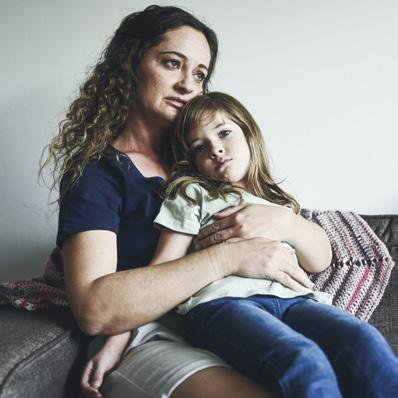Salvos fight against modern slavery
FAITH TALK
Grateful to give
STORY
In good company

Salvos fight against modern slavery
Grateful to give
In good company
Gratitude a tonic in the tough times


“Let us be grateful to the people who make us happy; they are the charming gardeners who make our souls blossom.” Marcel Proust
What is The Salvation Army?
The Salvation Army, an international movement, is an evangelical part of the universal Christian Church.
Vision Statement
Wherever there is hardship or injustice, Salvos will live, love and fight alongside others to transform Australia one life at a time with the love of Jesus.
Mission Statement
The Salvation Army is a Christian movement dedicated to sharing the love of Jesus by:

• Caring for people

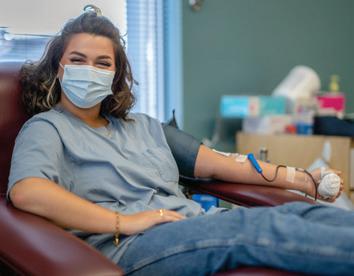
• Creating faith pathways
• Building healthy communities
• Working for justice
The Salvation Army Australia acknowledges the Traditional Owners of the land on which we meet and work and pay our respect to Elders, past, present, and future. We value and include people of all cultures, languages, abilities, sexual orientations, gender identities, gender expressions, and intersex status. We are committed to providing programs that are fully inclusive. We are committed to the safety and well-being of people of all ages, particularly children.
Founders William and Catherine Booth
General Brian Peddle
Territorial Leaders
Commissioners Janine and Robert Donaldson
Secretary for Communications and Editor-In-Chief
Lieut-Colonel Neil Venables
Publications Manager Cheryl Tinker
Assistant Editor Simone Worthing
Graphic Designer Ryan Harrison
Editorial phone (03) 8541 4562
Enquiry email salvosmagazine@salvationarmy.org.au
All other Salvation Army enquiries 13 72 58
Press date 5 September 2022
Printed and published for The Salvation Army by Commissioner Robert Donaldson at Focus Print Group, South Granville, NSW.
World Gratitude Day takes place on 21 September. As we look around our world and our local communities today, it can seem challenging to find something to be grateful for. Many of us are dealing with illness, financial struggles, relationship breakdown or stress of some kind. Globally we all see the impacts of war, climate change and a range of natural and human-made disasters.
The thought of being grateful can make us cringe or scoff, knowing that just ‘thinking positive’ will not change our circumstances. However, as Jo-anne Brown writes about in this edition, seeing things to be genuinely grateful for can reduce our pain and grief and give us a new perspective on whatever we are facing, even as we grieve or struggle.
Also this month, on 25 September, the Salvos will hold an International Day of Prayer for Victims of Human Trafficking. This edition includes a feature on what the Salvos are doing to fight this international crime and assist its victims, as well as what individuals and communities can do to join the global response.
For these stories and more, go to salvosmagazine.org.au
Simone Worthing Assistant Editor
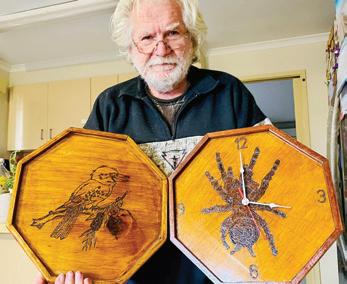
Feature [4] Give thanks … in all things? Really?
The Salvation Army is about giving hope where it’s needed most.
As a university student, I struggled with life, uncertain about relationships, my future and myself. The world seemed dark and lonely, and I felt I’d lost all motivation and enthu siasm. A friend suggested I count 10 things I’m thankful for as I went to sleep each night. I didn’t think much of the suggestion, and I doubted it would change my situation or how I felt, but I thought I would give it a go. Despite the darkness of my thoughts and feelings at the time, I was surprised by how easy it was to come up with 10 things I was thankful for. And it helped!
I didn’t continue this, but I’ve occasionally returned to the practice, especially during difficult times. Some years ago, a cat I loved very much died, and it helped me in my grief
to remember how much joy he had brought to our lives. He’d been a street cat and wouldn’t have lived as long as he did if we hadn’t adopted him. I was very thankful that the last few years of his life were in a comfortable home with people who loved him.

Of course, if we are sad, we need to let ourselves grieve. Being thankful doesn’t magically make everything all right. It can, however, reduce the pain of our grief and open up another perspective.
So, what is gratitude? Basically, it is an appreciation for what is good in our lives, for things and experiences that have freely come our way, and often things we take for granted: hearing kookaburras laugh, enjoying a cup of tea, seeing the beauty of the sunset or a smile from someone who cares about us. It’s easy to be thankful when all is going well in our lives, but the real challenge is being thankful when life is difficult.
This is one of those difficult verses from the Bible: “Give thanks in all things” (1 Thessalonians chapter 5, verse 18).
The author, Paul, is writing to a group of people who knew that life could be really hard – just as we know how hard life can be. Can I really give thanks when I’m sad, in pain or when I’ve just had a nasty fight with someone I love?
Well … yes. It doesn’t mean it’s easy, and it doesn’t mean I’m thankful for the sadness, pain or fight. It means that even though I’m
sad, sore or angry, there’s more than just those things in my life. There’s always something to be thankful for. There have been times when I have felt almost overwhelmed by physical pain, and I learned to be deeply grateful for a hot shower.
much time or effort, and, with just a little practice, can become an easy, consistent rhythm in our lives.
Being thankful doesn’t magically make everything all right … but it can reduce the pain of our grief and open another perspective.
Developing this habit begins with choosing to practise gratefulness and is strengthened when we pause throughout the day (or at the end of it) and notice the people, things and experiences we are thankful for. We take a moment to express this appreciation – it might be a silent acknowledgment of our thankfulness, we might want to call or message someone to express our gratitude, or we can simply pray “Thank you”.
As we grow in gratefulness, life becomes more joyous!
Jo-anne Brown is a retired Salvation Army officer (pastor) and spiritual director in Queensland.
Research shows that gratefulness has many benefits: it enhances physical and psychologi cal health, strengthens relationships, gives us more joy, and improves sleep and selfesteem, among other things.*

The wonderful thing about gratefulness is that it doesn’t cost anything, needn’t take
*For more information, check out gratefulness.org Scan here for more on mental health.
Modern slavery is a non-legal term used to describe economic exploitation achieved through force, fraud, coercion or abuse of vulnerability. It’s a crime described as ‘hidden in plain sight’ because victims are often working right in front us – on farms, in restaurants, massage salons and as cleaners – but are too scared to seek help.
Australia has made some progress in recent years, but we’re still lagging behind similar countries, with the majority of victims going undetected and conviction rates remaining low. One of the reasons for this is that the community has not been given the opportunity to learn how to detect modern slavery or the tools to respond effectively if they see signs of exploitation.
There are also issues with how we provide support in Australia. Right now, government support is only available through engagement with law enforcement. This is an issue because there is strong evidence to suggest that victims’ fear of police prevents them from seeking help.
Without a critical rethink, Australia will continue to underidentify victims of this terrible crime, leaving many to either remain in slavery or take enormous personal risks to negotiate their own safety. Additionally, traffickers will continue to go unpunished.
» We can provide victim-centred pathways to timely, needs-based, unconditional support. We can also provide tools and education for service providers and the general public to recognise the indicators of modern slavery and take appropriate action. In this way we can increase the support available to victims and increase visibility of this crime.

» We can build on our understanding of modern slavery risks and ensure we are not contributing to it. States and territories can support research and data collection to inform the national understanding of modern slavery. States and territories can also update public procurement rules to make sure that
For every one victim identified in Australia, four remain undetected
The Global Slavery Index estimates up to 15,000 people are in some form of slavery in Australia.
Less than 30 individuals have been prosecuted for slavery and trafficking crimes in Australia.
There are over 40 million people in modern slavery around the world. Most are women and girls.
The average modern-day slave is sold for $90–$100.
government spending is in line with human rights and sustainability principles.
» We can learn more about the indicators of modern slavery. We can be alert to modern slavery risks in our own communities and seek information and advice from anti-slavery organisations if we see any risk signs.
» We can consume ethically. We can look into the modern slavery ethics of the companies where we spend our money and make decisions that support companies that are taking an active stand to eradicate modern slavery.

The Salvation Army has been part of the fight against human trafficking and slavery since its beginning in London in the 1880s.
Today, Salvos around the world, including Australia, continue these efforts through a range of programs and initiatives, aware ness-raising, research, collaboration, advo cacy and the development and evaluation of evidence-based practice. The Salvos also hold an annual International Day of Prayer for Victims of Human Trafficking on the fourth Sunday in September.
increase the Salvos’ capacity to respond to potential cases of modern slavery nationally.
SLAVERY IN AUSTRALIA
modern slavery in Australia presents itself in several forms, including human trafficking, slav ery, forced labour, forced marriage, domestic servitude, debt bondage and extreme cases of child labour. According to the Global Slavery Index, there could be as many as 15,000 men, women and children held in modern slavery at any given time in Australia.
“These numbers are really profound when we are thinking about the lived experience of the individual,” says Sonali Correi, The Salvation Army’s Family Violence Team Leader in north-west Victoria. “And it’s important that Australian society is made aware of its preva lence. I joined the Salvos around a year and a half ago and was introduced to the amazing work they are committed to around modern slavery. I was keenly interested to join the community of practice because I saw it as an opportunity to enhance my understanding, awareness, knowledge and skills in supporting victim-survivors of modern slavery as an individual.”
Sue Hodges, the Salvos Aboriginal and Torres Strait Islander Engagement Coordinator in NSW/ACT, is also part of the COP.
In Australia, the Salvos have established a modern Slavery Community of Practice (COP). The COP will strengthen anti-slavery programs by leveraging organisational expertise through a national peer and leaders network, and
“We discuss serious issues of human rights and social justice in the COP, and work towards solutions,” she explains. “In the Aboriginal and Torres Strait Islander team we fight for human rights all the time. I can talk about being allies for those experiencing human trafficking and modern slavery. We’ll do our best to stand united against actions that perpetrate and condone such despicable behaviour.”

more than 117 mSHTR personnel. Everyone Everywhere provides readers with highlights of actions undertaken through the year including prayer, prevention, participation, protection, partnership, prosecution, policy and proof.
The Salvation Army’s International Social Justice Commission (ISJC) in New York City, USA, recently launched a landmark report on its global response to modern slavery and human trafficking (mSHT).

Everyone Everywhere outlines progress towards achieving a strong and sustainable mSHT Response (mSHTR) in all 133 countries where the Salvos work.
The report celebrates and acknowledges how so many people worldwide are making a difference by addressing mSHT within their communities. A key impact outlined in the report showcases how The Salvation Army supported 9795 survivors in 2021 – a 70.7 per cent increase since 2020.
The report also provides an update on The Salvation Army’s focus on further expanding survivor inclusion and engagement.
Everyone Everywhere highlights four main global goals: strengthening systems, growing leaders, educating and equipping, and mobil ising to respond holistically.

In efforts to meet goal four of expanding its global network, Communities of Practice are active around the world as a space of belong ing and shared learning opportunities for
“From corps officers [pastors] in Uganda practising restorative justice by providing counselling sessions to offenders of mSHT, to Sweden and Latvia assisting with Sweden’s largest case of human exploitation in modernday history, The Salvation Army has a unique role in partnering with God and others to help make justice, freedom and shalom [peace] a reality in the communities we are a part of,” says Priscilla Santos, International mSHTR Coordinator for The Salvation Army.
“While no one can end mSHT alone,” she adds, “everyone everywhere can do something. And together, we’re getting closer every day.”
For more information, go to salvationarmy. org/isjc/everyone-everywhere
It’s a cold, wet Friday night in melbourne’s CBD. A young woman with an injured knee is sitting on the kerb, struggling to hail a taxi. She sighs with relief as a distinctive vehicle turns the corner and pulls over. It’s the Salvos in their new Pink Car. Help is at hand, and she knows she will get home safely.
– a number emblazoned on the car next to the Red Shield – Salvo workers are ready and waiting to help women in need.
Collingwood AFLW players Brittany Bonnici and Sarah Rowe are ambassadors for the Pink Car, part of the magpie Nest Women’s Program at Project 614, which helps women find long-term housing.
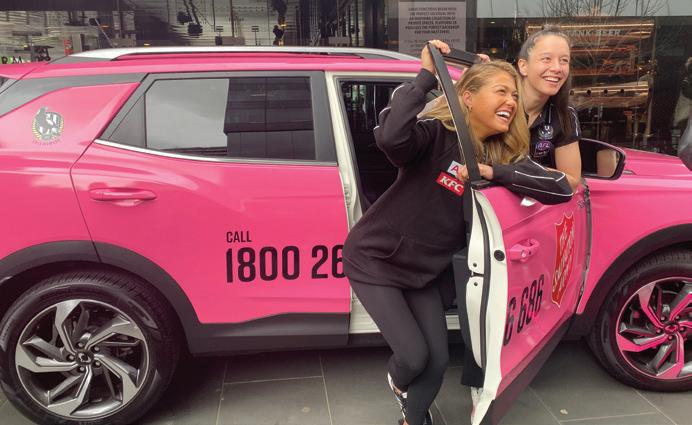
“The Pink Car is an important asset to the city of melbourne,” said melbourne Lord mayor Sally Capp. “We are so proud to coordinate and collaborate with The Salvation Army and their project.”
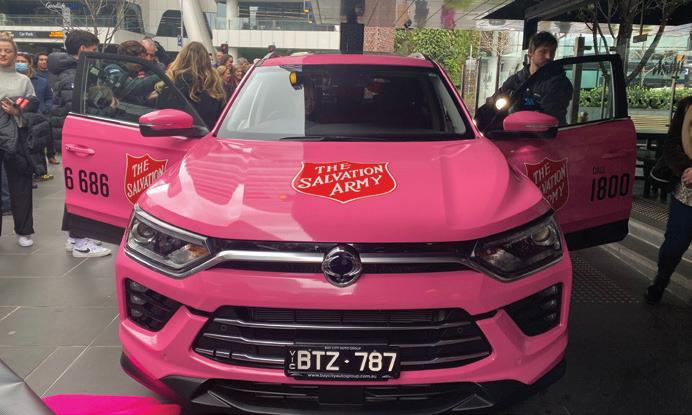
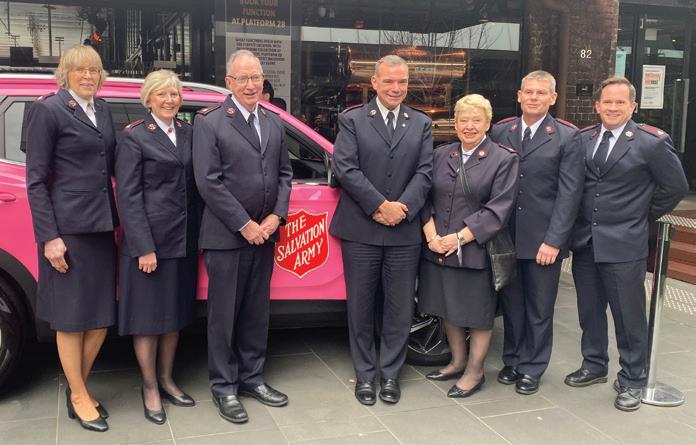
The Pink Car is a joint venture by The Salvation Army Project 614 Street Teams and Collingwood Football Club, in conjunction with the City of melbourne and the City of Stonnington. It can be seen patrolling the streets of melbourne on Friday and Saturday nights from 10pm to 4am, with two females on duty – a social worker and a volunteer.
Victoria Police are also working alongside the Salvos, referring women to the Pink Car. “Everyone in our community has the right to feel safe, and our partnership with The Salvation Army supports us to do that,” said Deputy Commissioner Neil Paterson. “We look forward to seeing a fleet in the future!”
The launch of the Pink Car drew much interest.
Receiving referrals through agencies, police, paramedics or a phone call to 1800 266 686
Project 614 leaders majors Brendan and Sandra Nottle made special mention of volunteer Anne malloch, who was heavily involved in discussions to bring about the Pink Car initiative. Anne sadly passed away from motor neurone disease recently, and the first Pink Car has been named ‘Anne’s Van’ in her honour. – Jessica Morris
I reached a milestone that I am particularly proud of late last year. I attended the local blood donor centre for my 50th donation.
I have been a donor on and off for over 30 years. I was donating some of my A+ blood (the same type as roughly 31 per cent of the population) every three months, but in recent years I have swapped to plasma, which I can donate every two or three weeks.
the free refreshments provided to ensure that you have some recovery time before you head back out into the world.
Things have changed dramatically since I started donating. I now book my appoint ments via an app and can see how many donations I have given. I was quite excited as my 50th donation approached. I wasn’t exactly sure what I expected, but I can honestly say I was relatively underwhelmed.
Not a single staff member mentioned that it was my big 5-0. There was no hoopla or celebration. I was prepared to be humble in accepting their gratitude for my generosity and persistence, but none was forthcoming.
I started giving blood with my dad, who was the rarer blood type of A- (about seven per cent of the population). He was always diligent in offering his life-saving blood, plasma or platelets whenever asked. He just wanted to help and taught me that it was a minor inconvenience that could bring significant advantage to others facing a health crisis.
He had good veins, and when we donated together, we learned that I needed to be seen first because I am a slower bleeder. Even then, he would often be waiting for me in the refreshments area until I had finished. That’s one of the good things about being a donor – spending a little time indulging in
As I was starting to feel frustration building within me, I realised I needed to recalibrate my attitude.
The rewards of being part of change for others
Words Belinda Davis
Partway through this donation, as I was starting to feel frustration building within me, I realised I needed to recalibrate my attitude. Why, after all, was I donating in the first place? Was it the free snacks, Wi-Fi and potential accolades, or was it to be a part of the healing journey for people I will never meet? Of course, it is the latter, so I stopped focusing on the wrong thing, relaxed into the comfy chair and continued reading my book.
I was prompted to think about our innate human need to be acknowledged for good actions and found this verse in the Old Testament: “I the Lord search the heart and examine the mind, to reward each person according to their conduct, according to what their deeds deserve” (Jeremiah 17:10).
This demonstrates that while I might be doing a good thing, if my heart and mind are not doing it for the right reason, I won’t receive the reward I might believe God owes me.
I am glad I checked my attitude and was truly able to enjoy the reward of the act itself. I write about this today for two reasons, neither of which is about wanting to draw more attention to my donation: Firstly, I want to encourage you to think about things you might be hoping to be noticed and rewarded for. As I found, it is easy for our attitude to drift from its initial intention. Secondly, I recommend becoming a blood or plasma donor if you aren’t already and are able. It can make such a difference in the lives of others and yours as well.
Belinda Davis is a Salvation Army officer (pastor) in South Australia. She blogs
Scan here for more on mental health.
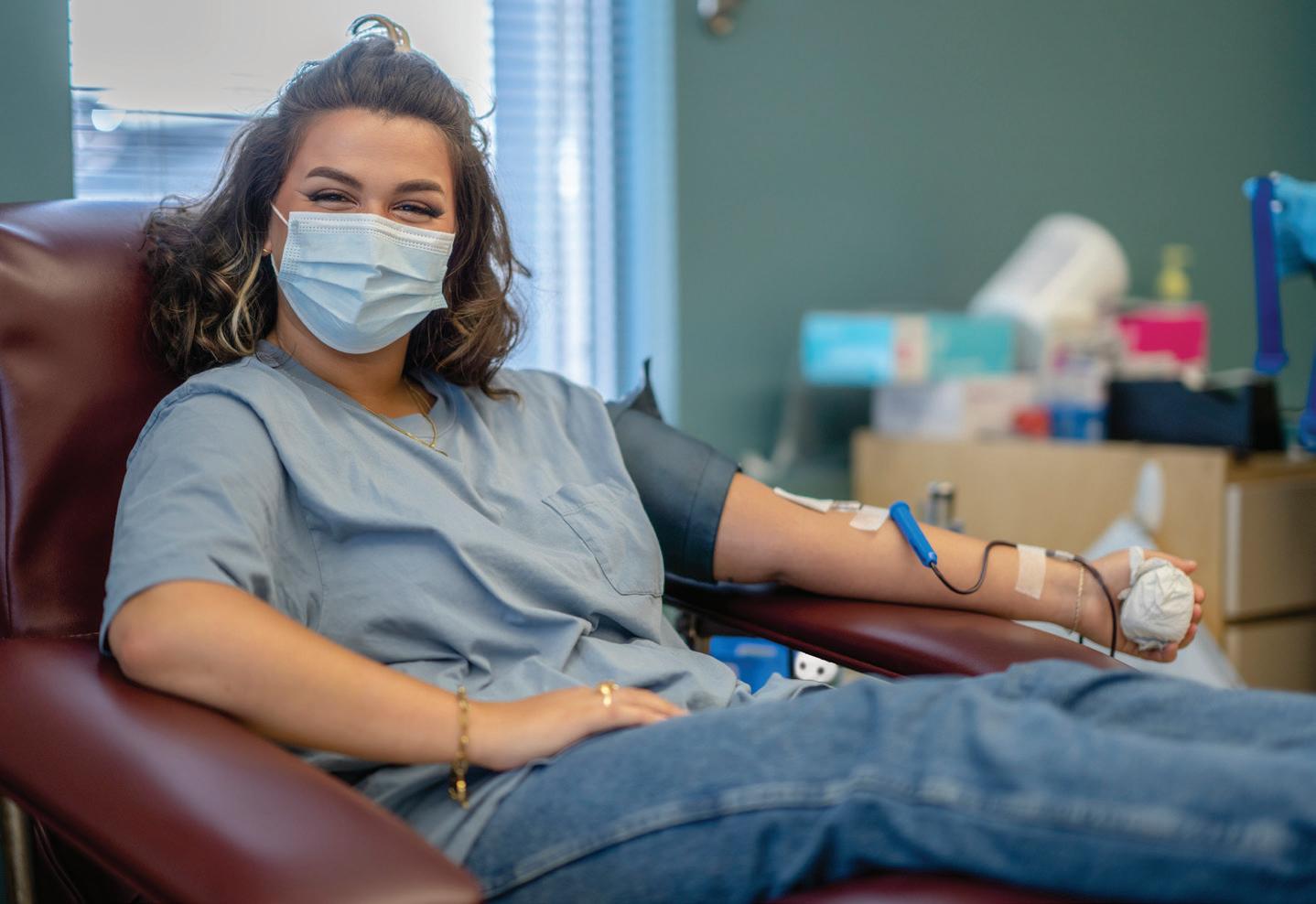
men’s Sheds give Tony an opportunity to enjoy his creative side, get together with friends and enhance his mental wellbeing
Salvos Home Care client Anton (Tony) holds a wooden spider clock that he has been making and explains how he manages stress and anxiety.
“When I am in the world of wood carving and wood burning, it involves a lot of imagina tion and energy,” he says. “It helps me to concentrate only on the piece of wood I am making, and that allows me to forget negative thoughts. Thinking of the creative work brings positive images to mind instead of negativity.”
Tony laughs and shows off another of his wood work creations. “What I’m doing has enough energy to keep me positive for the whole day,” he explains. “It is a different feeling when I am designing. The challenge to make this gives me pleasure – that is the power of carving.”
Tony, who also cares for his wife, learned wood carving and wood burning from a men’s Shed, which was unfortunately closed for most of the COVID-19 pandemic.
A PRODUCTIVE EXPERIENCE men’s Sheds have a significant role to play in the lives of people like Tony. They are community-based, non-commercial organisa tions that provide a safe, friendly and inclusive environment, helping men come together in the company of each other to support mental health through learning, creativity and productivity. In addition, research shows that pro-social behaviour and positive social rela tionships can lead to improved life expectancy.
“I have made miniature furniture, toys, candle holders, wishing wells, knife holders, clocks
with many themes, and even a motor bike,” Tony says of his woodwork.
“Sometimes we make furniture for schools and toys for childcare centres at just the cost of raw materials. Some of the items we sell in a shopping centre, and we buy our equipment. It’s another opportunity for us to tell others about the men’s Shed and interact with more people. I have learnt to keep out of stress by doing something good.”
Apart from providing a space for friendship and to socialise, men’s Sheds also offer oppor tunities to learn a wide range of activities such as manual crafts, gardening, beekeeping, toy-making and other skills including First Aid and health and wellbeing awareness.
many Salvation Army Aged Care Centres offer men’s Sheds or similar activities. The Australian men’s Shed Association is the peak body, supporting almost 1000 men’s Sheds across Australia and it is funded through the Australian Government’s National Shed Development Program.
Research conducted by Beyond Blue and the Australian Men’s Shed Association found that there is a significant improvement in Men’s Shed participants’ mental health, vitality and physical functioning, and a reduction in anxiety and depression.
According to Beyond Blue, “It is thought that between 10 and 15 per cent of older people experience depression and about 10 per cent experience anxiety.”
Healthy eating, staying hydrated, regular phys ical activity or exercise, study and relaxation techniques, as well as good sleep hygiene, are also essential to maintain good mental health.
As Tony is successfully doing, engaging in activities such as wood carving and art can
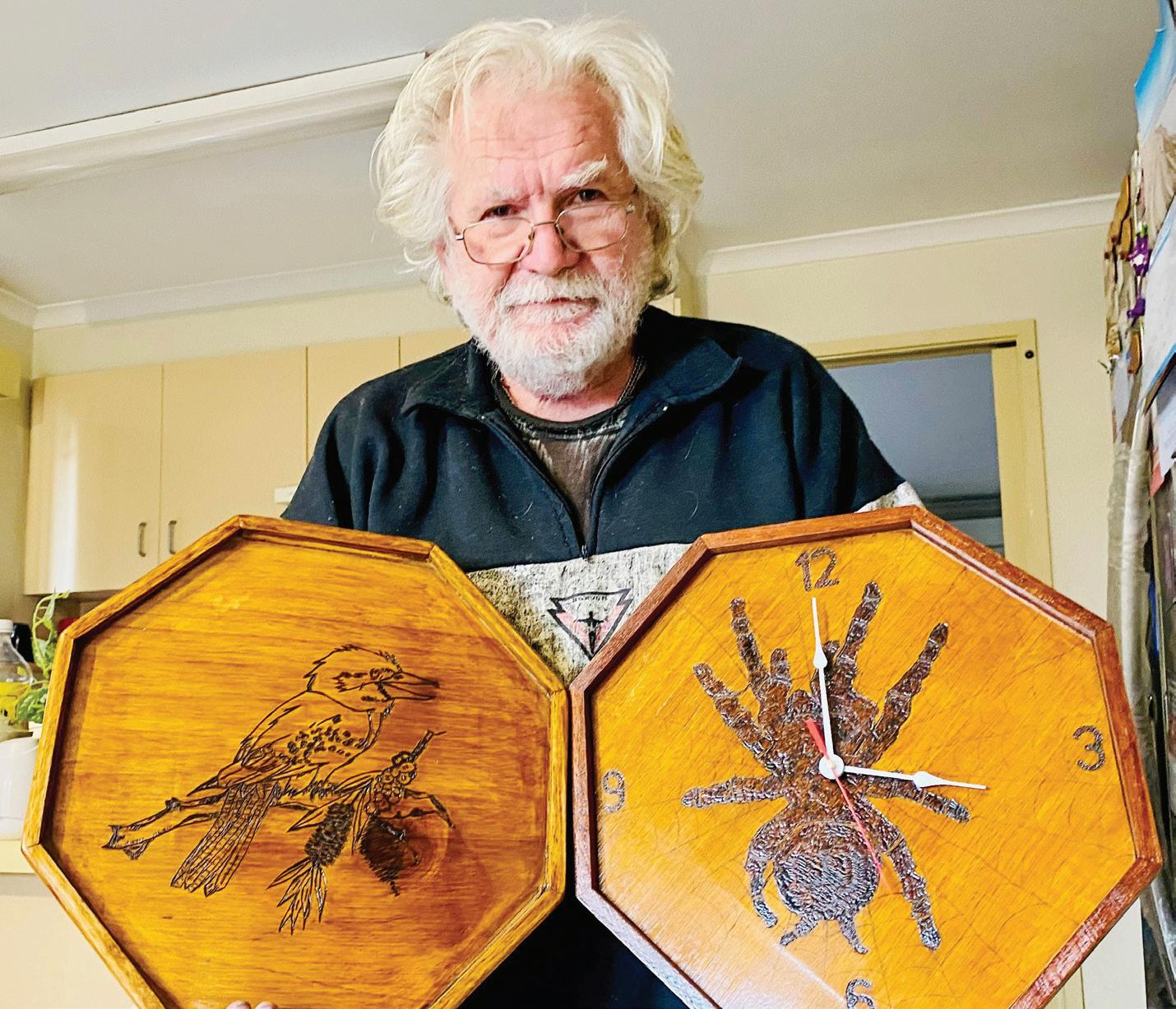
help to support positive mental health and provide improvements in terms of quality of life, while also increasing an individual’s capacity to support their family and their mates.
For more information, check out: Beyond Blue: beyondblue.org.au/ who-does-it-affect/older-people
Men’s Sheds Australia: Effects on Physical Health and Mental Wellbeing bit.ly/3pY8Rod
Scan here for more on mental health.
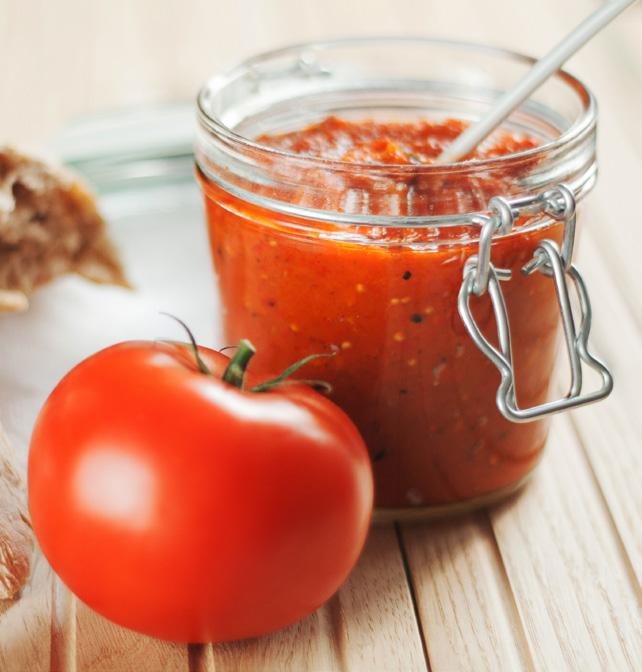
How do you show bananas your gratitude? By saying “thanks a bunch!”
3 kg Roma tomatoes, 1.5 kg brown onions, salt, ¾ cup vinegar, 1 kg sugar, 2 tbsp curry powder, 3 tbsp mustard powder, 4 tbsp plain flour.
• Cut up tomatoes and onions. Sprinkle with salt and leave overnight in a large pot.
• Add vinegar and sugar. Gently bring to the boil and cook for 1 hour.
• In a separate bowl, mix curry powder, mustard powder and plain flour with a splash of vinegar to make a custard consistency. Stir into relish.
• Simmer together for about an hour or until relish thickens.
• Bottle immediately in sterilised jars. It must be still hot so the jar seals.
This Australian recipe is part of a collec tion compiled by Salvation Army staff, personnel and volunteers to celebrate cultural diversity within the Salvos and in our communities.
How do hot dogs say thank you?
Franks a lot!
What was the mathematician thankful for?
Pi.

Whatever you do today, do it with the confidence of a fouryear-old in a Batman T-shirt.
which page
1. The theme song ‘Thank You for Being a Friend’ is from which TV sitcom?

2. Earth, Wind & Fire released their single ‘Gratitude’ and double live album by the same name in what year?
3. Which US President said, “We must find time to stop and thank the people who make a difference in our lives?”

4. ‘Say it with Flowers’ became the most famous slogan associated with which company?
From which of Shakespeare’s plays is the quote, “I can no other answer make but thanks, and thanks; and ever thanks”?
Writing down whatyou’re grateful for – yes,with a pen and paper– has been linked in research to a multitude of health benefits.
In the Philippines, people value gift-giving for gratitude more than saying thank you.
The idea of thankfulness is mentioned in the Bible’s New Testament 71 times.
and other

